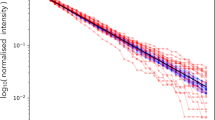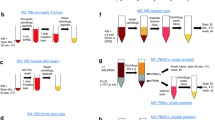Abstract
WHEN immature mammalian red cells, or reticulocytes, are stained with brilliant Cresyl Blue they may be differentiated from adult red cells and enumerated in a sample as a percentage. If these cells were scattered according to chance, reticulocyte counts would be expected to follow the binomial distribution. In a recent paper, however, Jacobsen, Plum and Rasch1 have shown that, in their laboratory, reticulocytes appear to be more regularly arranged than this when present in a proportion greater than 10 per cent. They are therefore able to make counts on one sample with remarkably close agreement. Much of the important work on reticulocyte maturation carried out in their laboratory depends on the great accuracy with which this technique is used. It was therefore thought that an independent attempt to confirm this deviation from the binomial distribution would be of interest.
This is a preview of subscription content, access via your institution
Access options
Subscribe to this journal
Receive 51 print issues and online access
$199.00 per year
only $3.90 per issue
Buy this article
- Purchase on Springer Link
- Instant access to full article PDF
Prices may be subject to local taxes which are calculated during checkout
Similar content being viewed by others
References
Jacobsen, E., Plum, C. M., and Rasch, G., Acta Path. Microbiol. Scand., 24, 554 (1947).
Author information
Authors and Affiliations
Rights and permissions
About this article
Cite this article
BIGGS, R. Error in Counting Reticulocytes. Nature 162, 457–458 (1948). https://doi.org/10.1038/162457b0
Issue Date:
DOI: https://doi.org/10.1038/162457b0
Comments
By submitting a comment you agree to abide by our Terms and Community Guidelines. If you find something abusive or that does not comply with our terms or guidelines please flag it as inappropriate.



